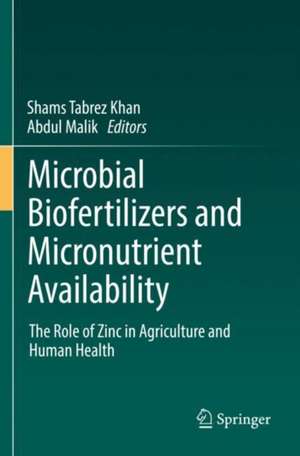Microbial Biofertilizers and Micronutrient Availability: The Role of Zinc in Agriculture and Human Health
Editat de Shams Tabrez, Khan, Abdul Maliken Limba Engleză Paperback – 8 dec 2022
| Toate formatele și edițiile | Preț | Express |
|---|---|---|
| Paperback (1) | 574.88 lei 38-44 zile | |
| Springer International Publishing – 8 dec 2022 | 574.88 lei 38-44 zile | |
| Hardback (1) | 798.18 lei 3-5 săpt. | |
| Springer International Publishing – 7 dec 2021 | 798.18 lei 3-5 săpt. |
Preț: 574.88 lei
Preț vechi: 718.60 lei
-20% Nou
Puncte Express: 862
Preț estimativ în valută:
110.02€ • 113.65$ • 91.56£
110.02€ • 113.65$ • 91.56£
Carte tipărită la comandă
Livrare economică 21-27 martie
Preluare comenzi: 021 569.72.76
Specificații
ISBN-13: 9783030766115
ISBN-10: 303076611X
Pagini: 461
Ilustrații: XIX, 461 p. 49 illus. in color.
Dimensiuni: 155 x 235 mm
Ediția:1st ed. 2022
Editura: Springer International Publishing
Colecția Springer
Locul publicării:Cham, Switzerland
ISBN-10: 303076611X
Pagini: 461
Ilustrații: XIX, 461 p. 49 illus. in color.
Dimensiuni: 155 x 235 mm
Ediția:1st ed. 2022
Editura: Springer International Publishing
Colecția Springer
Locul publicării:Cham, Switzerland
Cuprins
Chapter 1.- The enormity of Zinc deficiency: an overview. Chapter 2.- Zinc malnourishment in children and its impact on child health. Chapter 3.- Zinc deficiency and its consequences during pregnancy. Chapter 4.- Malnutrition: Impact of Zinc on child development. Chapter 5.- Role of Zinc in liver pathology. Chapter 6.- Role of micronutrients in abiotic stress tolerance in plants. Chapter 7.- Zinc as a versatile element in plants: an overview on uptake, translocation, assimilatory roles, deficiency and toxicity symptoms. Chapter 8.- Transition metal homeostasis and its role in plant growth. Chapter 9.- Role of Zinc homeostasis in plant growth. Chapter 10.- The multiple effects of microorganisms on plant nutrition. Chapter 11.- Role of minerals in plant growth and soil microbial consortia mediated mineral uptake by plants. Chapter 12.- Microbial bio-fertilizers an approach to deal with zinc deficiency. Chapter 13.- Zinc solubilization by bacteria for increased Zinc uptake by plant. Chapter 14.- Development of microbes based biofertilizer for zinc dissolution in soil. Chapter 15.- Soil microbes interaction: mineral solubilization and plant nutrition. Chapter 16.- Microbes Mediated facilitation of micronutrients uptake by plants from soil especially Zinc. Chapter 17.- Role of Rhizobacterial Bacilli in Zinc solubilization. Chapter 18.- Microbial bio-fertilizers an approach to deal with zinc deficiency. Chapter 19.- Comparing various diets as source of zinc with special reference to fruits and vegetables. Chapter 20.- Managing Zinc deficiency among children.
Notă biografică
Dr. Shams Tabrez Khan is an Associate Professor in the Department of Agricultural Microbiology at Aligarh Muslim University, India. His research interests include novel microbes and their implication in industry and environment and Nanobiotechnology/Nanotoxicology.
Dr. Abdul Malik is a Professor and Head of the Department of Agricultural Microbiology at Aligarh Muslim University, India. He has over 25 years of research experience in the fields of Agricultural Microbiology, Food Microbiology, Environmental Microbiology and Molecular Toxicology.
Dr. Abdul Malik is a Professor and Head of the Department of Agricultural Microbiology at Aligarh Muslim University, India. He has over 25 years of research experience in the fields of Agricultural Microbiology, Food Microbiology, Environmental Microbiology and Molecular Toxicology.
Textul de pe ultima copertă
This volume addresses various issues related to micronutrient deficiency, especially zinc, and discusses the possible approaches for combating mineral deficiency among humans and plants. The book mainly focuses on the zinc biofortification of vegetable and cereal crops and highlights the consequences of zinc deficiency and the health risks associated with zinc deficiency, especially in children and expecting mothers. The authors discuss different types of food that are rich in zinc and other minerals, how diets can be designed to meet the daily zinc requirements, and the impact of zinc deficiency on plant health and quality of agricultural products and the role of micronutrients in abiotic stress tolerance. The book also covers sustainable approaches to zinc biofortification in crops, such as the microbial solubilization of zinc in soil to improve zinc uptake by plants, and the formulation of these microbes into biofertilizers. The book will be of interest to dieticians, agricultural scientists, students and microbiologists.
Caracteristici
Addresses the issues related to micronutrient deficiency, especially zinc Discusses various approaches to combat mineral deficiency among humans and plants Highlights sustainable approaches to zinc biofortification in crops
